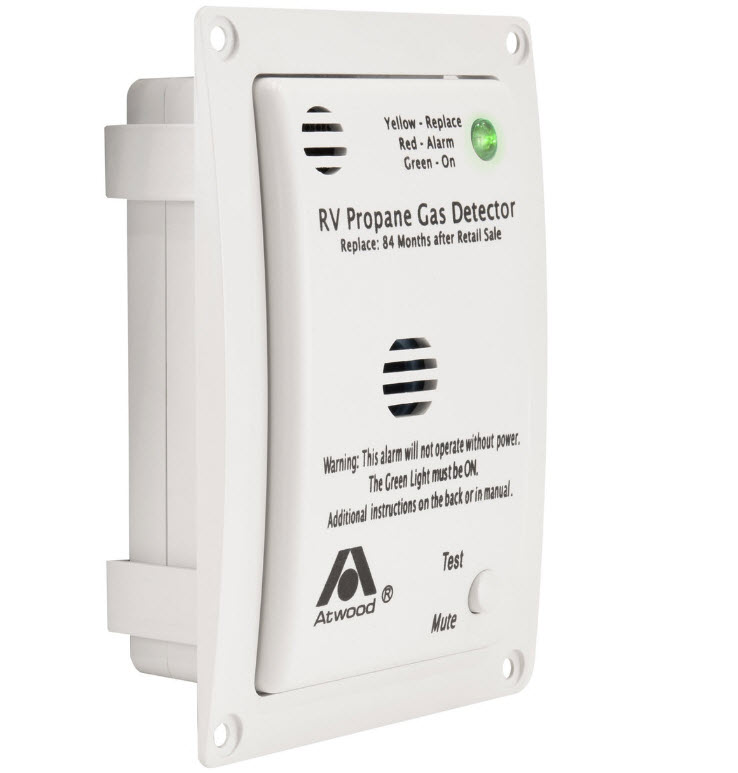The Operation of RV Propane Alarms
RVs are equipped with crucial safety features, including propane alarms to alert owners of potential propane leaks. Being awakened by their high-pitched screech is disturbing.
These alarms, also known as LP (liquified petroleum) detectors, are looking for propane. Gases like butane and propylene are also present in liquified petroleum.
Any time the RV propane alarm sounds, it should be taken seriously and handled as a possible leak. However, propane alarms are delicate and may sound erroneously.
In order to prevent this from happening and you and your family from ignoring a potentially dangerous scenario, it is crucial to understand how and why they might go off without a leak present.
Your RV’s propane alarm’s initial feature that you undoubtedly noticed is that it is placed low, possibly even on the floor. This is because propane will settle in low regions because it is heavier than air.
When it finds a certain amount of a gas in the air, the detector lets people know both visually and audibly.
Its science is straightforward. Because propane depletes the air of oxygen, the alarm sounds when the air pressure falls below a predetermined level. It will function even if you are not plugged into shore power because the unit will be linked to your RV’s 12-volt electrical system using battery power.
There will be a mute and a reset button on your RV propane alarm. After the alarm has gone off, it can be reset using the reset button. When it is reset and in operating mode, there should be a constant green light and no beeping sound.
The alarm can be momentarily turned off by pressing the mute button. This is meant to quiet the alarm during end-of-life beeping until you can quickly replace it rather than disregard the alarm.
What causes a propane alarm to go off in error?
Despite their sensitivity, RV propane alarms can sound for a variety of reasons. So why does your RV propane alarm occasionally go off?
Your alarm can be triggered by a variety of sprays, including cooking spray, Febreze, sunscreen, bug spray, and cleansers. Because they are preventing fresh air from entering the monitor, a pet sleeping on the floor and leaning against the alarm will cause it to go off. You might also be able to set off your alarm by using a soiled propane alarm that is covered in pet hair, dust, and sweeping debris.
Propane detectors are still functional 5-7 years after they were manufactured.Many people will experience an end-of-life alert at this moment. The pattern of the beep will be different from the alarm beep. The detector’s manufacturing date will be on the back, and when a new monitor is required, it should be purchased.
The 12-volt electrical system that the propane detector is connected to will not function properly if the RV batteries are low or dead. Even though a slow beep is heard more often than a loud alarm, the problem should still be looked into. In addition, check for blown fuses in addition, because the majority of machines have fuses either inline or at the fuse panel.
There is a reason why these detectors are so sensitive. For your safety, the alarm will sound if there is a change in the amount of fresh air reaching the sensor.
How to ensure proper operation
Being puzzled as to why your camper’s propane alarm keeps going off might be unpleasant. If it keeps making false sounds to the point where you ignore it and just turn it off or reset it, that can also be dangerous.
First, check to see if your propane detector is still within its useful life. Regardless of how well it works, change the alarm every five years.
Check your device’s ability to detect propane. The test button verifies that the red light and alarm function, but if at all possible, test with gas. Expose the monitor to gas using a lighter or tiny torch (no flame, the gas must not be burned); the alert should sound shortly after.
Keep the area around the appliance dust and debris-free. If dirt builds up, it can be carefully blown out with air.
Check the wiring on the rear of your unit for good connections and make sure it is receiving 12 volts from your RV battery if it isn’t powered on.
What to do if the propane alarm on your RV sounds?
It’s crucial to understand both the cause of your RV propane alarm’s occurrence and what to do in its wake.
Always take any RV propane alert seriously. Unconsciousness brought on by a gas leak could result in hazardous falls. Explosions and fires can also be brought on by unburned propane.
When the propane alarm on your RV sounds, everyone should get out of the vehicle right away. If at all possible, leave the doors open when you leave and slide a few windows open on the way by.
As soon as you step outdoors, shut off your propane supply. Before entering the RV again, let it have some time to air out. A portable gas monitor can be used to detect leaks and determine whether there is gas present. The handheld device is useful for checking for propane tank leakage.
Make sure the stove knob wasn’t accidentally left open when you got inside. The alarm would have sounded if there had been any unburned propane. The RV needs to have any leaks investigated if the alarm is reset and activates when the propane valve is opened once more. This phase should be left to a professional if you don’t feel confident doing it yourself or don’t have the necessary tools.
The reason why RV propane alarms are so loud and annoying is when it goes off, it should always be taken seriously. It is frequently a false alarm, but since you know why, you can try to stop it from happening again.




